 |
Shop front -
Full index -
Search in puzzles -
FAQ -
Contact us
-
日本語
"The room behind the shop" (editorial) - Puzzle manufacturers: Apollo - Appleone - Beverly - Cuties - Epoch - Ensky (Artbox) - Road - Tenyo - Yanoman - more history |
"The room behind the shop" (Editorial)
Japanese jigsaw puzzle manufacturers
On this page: Yanoman - Tenyo - Beverly - Appleone - Epoch - Apollo-sha - Road (Sunlike/Kezuka) - Ensky (Artbox) - Loose ends
|
Note - Editorial Content The logos and other trademarks on this page are for identification purposes only, and do not indicate any endorsement of this content by their respective owners. |
|
お断り このページに載っている商標などは、(特に日本語が読めない人への)識別や説明のためだけで、その会社との携帯などの関係を意味しません。 もし会社の歴史などに誤った記述がありましたら、ご指摘頂ければ訂正致します。ご意見をどうぞ。 |
July 2021: This page dates from my earliest investigations around the time Imaginatorium Shop opened its doors (2002!) ... I have made minimal updates with the move to imaginatorium.com.
It took more than two centuries from its invention in England for the jigsaw puzzle to reach Japan. But in quality terms, the new Japanese manufacturers took the opportunity to leapfrog, and from their beginning Japanese puzzles have always been made to a high standard. (Nothing like the puzzles I remember from my childhood in England, of flimsy thin cardboard, often not cut properly, so pieces would tear when you forced them apart.)
This page is not "complete": I would welcome any corrections or additional information. I have gleaned most of the information from simply trawling the manufacturers' websites. I've listed the pages I used for reference, and the main pages, but except where noted, all of these websites are in Japanese. Any errors on this page are almost certainly my fault.
Language note
![]()
Kabushikigaisha (KK)
Single character abbreviation
on the right
Japanese companies often identify themselves by quite different Japanese and (more or less) English names. But most of these companies are not operating overseas, so I have simply reproduced the Japanese names. The recurring abbreviation "KK" stands for kabushikigaisha (where the second K actually stands for the 'g' of gaisha/kaisha!) roughly corresponding to Inc. for US companies, or plc, Ltd., SA, GmbH, and so on for European ones. The kanji for KK (shown on the left) may come before or after the company name, and are often arranged in a square. Many companies start out as a "YK" (for yūgengaisha), a sort of junior privately-owned limited company.
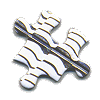 |
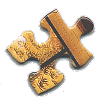 |
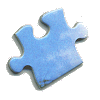 |
Yanoman
Current Yanoman logo + KK + company name in stylised hiragana
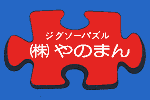
Yanoman logo on the old blue boxes
Originally formed in 1954, Yanoman sold its first imported 500-piece jigsaw puzzle - of the Mona Lisa - in 1973. Following the success of this venture, the very next year, 1974, saw the start of manufacture in Japan. And a mere three years later, on Christmas Day 1977 if I remember correctly, I was buying my first Japanese puzzle in a department store in Shinjuku - a beautiful 3588-piece view of the Japan Alps. I remember being unable to understand the bit on the front of the box about "Made from finest Scandinavian materials", but I suppose this bit of history explains it: presumably it was still difficult to get appropriate cardboard stock from Japanese manufacturers.
So Yanoman are the longest-established manufacturer, and one of the biggest ranges, with well over 400 puzzles in the current catalogue. They are also the only people I have found currently making puzzles of more than about 2000 pieces, but even so the range of bigger puzzles seems to be smaller than I remember twenty years ago. In 1986 they got into the Guinness Book of Records with a 61,752-piece puzzle. The current range does cover many genres: a range of art works, both Japanese and Western, scenery, and an inordinate number of cute but hackneyed photographs of puppies and kittens.
The name "Yanoman" comes from the company's founder, Mr. Yano; the current president is Yano Seiichi, who we can guess is a family member.
 |
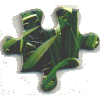 |
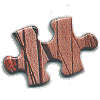 |
Tenyo

Current Tenyo logo

Older Tenyo logo (from an early 1990s puzzle)
Tenyo has an interesting history, and there's a quite readable summary in English on their website. Very briefly, the company was started in 1960 by the son of a famous magician, whose stage name was Shōkyokusai Ten'yō. That's where the name comes from, and not surprisingly the company was heavily oriented towards magic-related items. The first imported jigsaw puzzle was sold in 1973, exactly the same year as Yanoman, so it's not strictly clear who was first. Although Tenyo have produced many jigsaw puzzles over the years, the range now is almost entirely "character" items, the great majority licensed from Disney.
Anyway, the end result of this is that the jigsaw puzzle index page on the Tenyo website has a rather aggressive "No sales overseas" notice on the puzzle index page.
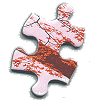 |
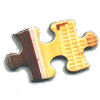 |
 |
Beverly

Current Beverly logo and company name in katakana
![]()
Former Beverly "Orange" logo (from an early 1990s puzzle)
This company only started out in 1977, with the rights to market wooden puzzles by Dick Bruna. They seem to have specialised in puzzles of Western artists - I remember the M. C. Escher series from the early 1990s, and there is now a very extensive set of the "shiny purple" underwater fantasy paintings of Christian Riese Lassen. The range includes quite a few other artists, plus scenery and the usual cutesy small animals. There is a total of well over 300 puzzles in the current catalogue.
There are no obvious clues as to the origin of the name. The slogan in small print in the logo also appears in a translated English version: "We'll create your enjoyable time." Hmm.
 |
 |
 |
Appleone

Appleone logo and name (from puzzle box)
This is a young company, founded in 1989. It offers a medium-sized range, with about 180 puzzles in the current catalogue, but features a number of interesting Japanese artists and the photographer Mizuno Katsuhiko's images of Kyoto.
The name? Well, it seems to consist of the English words "Apple" and "One", joined together. OK?
 |
 |
 |
Epoch

Epoch logo + KK + company name in katakana - from the former http://www.epoch-info.com website
Founded in 1958, Epoch is a general games and toys manufacturer - for example, in 1975, they produced the first TV "Ping pong" game in Japan - and they now appear to have the largest range of puzzles in their catalog. It's not clear when they first became involved with jigsaw puzzles, but the first mention in the company history is the 1983 establishment of KK Bon ("the former Bon Puzzle"), which Epoch later absorbed. They also acquired Central Hobby in 2000, from Takara, another large toy and game company; there are some older puzzles still in stock bearing the "Central Hobby" name, but it now appears to have been phased out.
In addition to a subsidiary in Hong Kong, in 1998 Epoch Vietnam was established. (This allowed some puzzles to bear the inscrutable legend: "Printed in Japan Assembled in Vietnam". Assembling a jigsaw puzzle? By cutting it into pieces?) More recently, Epoch has its own factory in China.
(It may be worth mentioning the special status of the Japanese expression kakki-teki - one of the most overworked buzzwords of the twentieth century. There surely cannot be a working Japanese-English translator who has not groaned a hundred times before translating it as "epoch-making.")
Website: current details
 |
 |
 |
Apollo-sha
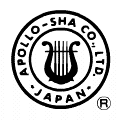
The Apollo logo
Apollo was a general toy manufacturer, but with a good range of jigsaw puzzles, particularly of the Peanuts and Umekichi characters. They entered some kind of collaboration with Epoch in around 2009, and finally became part of the Epoch group in 2011. Epoch still uses the Apollo brand for children's puzzles and toys. (Back in 2002 I failed to find any historical information about the company.)
The company logo is a lyre, so I presume it is named after the Greek god. The -sha suffix simply means "company", though this style of name sounds rather old-fashioned; I'm fairly sure the circular design above is also several decades old.
 |
 |
 |
Road (Sunlike/Kezuka)

Road logo

Sunlike logo
This brand was always something of a mystery. The logo includes the word "Station" together with the word "Road", and when I first investigated in 2002 these puzzles were sold by a company called Sunlike. But at about that time the business was transferred to a different company, Kezuka Gōshisho KK ("Kezuka Paper Products"), who produced the same range until the beginning of 2017, when production finally ended.
Sunlike was established in 1971 as YK Arasan-Shōkai, to produce a range of toys and novelty items, including jigsaw puzzles, and the company name was changed to "KK Sunlike" in 1978. The Kezuka company was extremely elusive, never having a website, so there are no more details at all.
 |
 |
 |
Ensky, Artbox brand and parent company Amada Printing Mfg. Co.

Amada company name in the original versin of this page, 2002
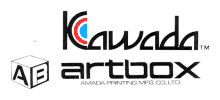
Earlier Artbox logo from a puzzle box, with mystery "Kawada" name
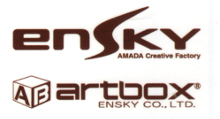
Current Ensky/Artbox logo
The Amada paper toy manufacturing company started operations in 1938, and was incorporated in 1956. Gradually the emphasis (and the company name) changed from toys to printing: playing cards, calendars, and so on. Jigsaw puzzle manufacture began in 1986, using the "Artbox" name. In mid-2005 the puzzle marketing arm was split off with the Ensky name.
This company produces almost entirely licensed "character" puzzles, in particular with a huge range of puzzles and other items such as stationery and toys of characters from the Ghibli Studio animations. These seem to use exclusively the "Ensky" name, whereas non-Ghibli puzzles retain the "Artbox" name.
Website: current details
 |
 |
 |
Loose ends
The following are names that have been absorbed by other companies, or are otherwise obscure.
Central Hobby

Central Hobby - 'Sunday Puzzle' box
I can't find the origins of the Central Hobby name; Epoch acquired the business from Takara in 2000, but whether Takara were the original owners is not clear. The name has been around for some years: this is the box of a puzzle we bought in the early 1990s.
Bon

Bon logo
This appears to have been a subsidiary of Epoch, but its origin is unclear. The logo is taken from the box of a puzzle bought in 1990 - the cardboard and cutting is of the usual impeccable standard, but the printing detail is very noticeably less sharp than other puzzles. (May just have been this particular one, of course.)
Sunbird
Sunbird logo
The logo is from a puzzle we bought in 1997. It seems they may still be in production, but I can find no details.
Diamond Press
"Diamond Press" (not the logo)
I've seen a few puzzles recently with this name, but can find nothing about the company. The name is written in katakana as on the left, but note that the type face will be slightly different.
Bigben
Again I've seen a few puzzles with this name, but that's all I know. The company name is written in rather blocky stylised Roman letters, and as usual, it's not really possible to tell if there is meant to be a space between "Big" and "Ben" or not.
